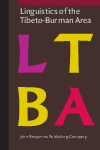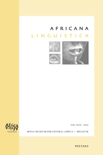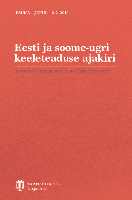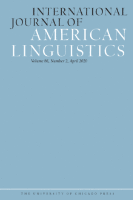
Linguistics of the Tibeto-Burman Area
Scope & Guideline
Illuminating Language Structures of the Tibeto-Burman Region
Introduction
Aims and Scopes
- Empirical Linguistic Research:
The journal emphasizes original research based on fieldwork, providing detailed descriptions of lesser-studied Tibeto-Burman languages and dialects. - Phonological and Phonetic Analysis:
A significant focus is placed on the phonetic and phonological aspects of Tibeto-Burman languages, including tone systems, voice onset time, and sound change phenomena. - Syntactic and Morphological Studies:
The journal covers syntactic structures and morphological systems, exploring verb forms, agreement, and the use of classifiers across different languages. - Cultural and Sociolinguistic Contexts:
Research often examines the intersection of language and culture, including kinship terms, honorific registers, and the impact of language on cultural identity. - Comparative and Historical Linguistics:
The journal includes comparative studies that investigate relationships among Tibeto-Burman languages, contributing to the understanding of language evolution and historical linguistics. - Documentation and Description of Undocumented Languages:
A core aim is to document and describe languages that are underrepresented in linguistic literature, thus preserving linguistic diversity.
Trending and Emerging
- Integration of Phonetics and Phonology:
Recent papers are increasingly analyzing the relationship between phonetics and phonology, highlighting how sound systems interact and change within Tibeto-Burman languages. - Reflexive and Honorific Language Features:
There is a growing interest in the study of reflexive pronouns and honorific registers, reflecting broader trends in sociolinguistics and the exploration of politeness strategies in language. - Language and Cultural Knowledge Preservation:
Emerging themes focus on how language reflects and preserves cultural knowledge, showcasing the importance of linguistic studies in understanding cultural heritage. - Interdisciplinary Approaches:
The journal is increasingly embracing interdisciplinary methods, combining insights from anthropology, sociology, and cognitive science to enhance the understanding of linguistic phenomena. - Fieldwork Methodologies:
There is a notable trend towards innovative fieldwork methodologies, with researchers employing new technologies and approaches to enhance data collection and analysis.
Declining or Waning
- Traditional Language Documentation:
There seems to be a gradual decrease in papers focused solely on traditional language documentation without a theoretical or comparative analysis, indicating a shift towards more analytical studies. - Historical Linguistics without Empirical Data:
Research that focuses purely on historical linguistics without empirical data from fieldwork appears to be diminishing, as there is a growing emphasis on empirical evidence in current publications. - Descriptive Studies of Well-Documented Languages:
There is a noticeable decline in studies of well-documented Tibeto-Burman languages, as the journal is increasingly prioritizing research on lesser-known and endangered languages.
Similar Journals

Studi e Saggi Linguistici
Empowering Linguistic Scholarship for a Global AudienceStudi e Saggi Linguistici is a distinguished academic journal published by EDIZIONI ETS, based in Pisa, Italy. With its ISSN 0085-6827, this journal has established itself as a vital resource in the field of linguistics, particularly noted for its contributions since its inception in 2016. Although currently categorized in the lower quartile (Q4) by the 2023 metrics in the domains of Linguistics and Language within Scopus, it remains a significant platform for innovative research and critical discussions surrounding language studies. Focusing on both theoretical and practical aspects of linguistics, the journal serves as a nexus for scholars and practitioners alike, facilitating a rich interchange of ideas and knowledge in a rapidly evolving discipline. As an invaluable publication for researchers, professionals, and students, Studi e Saggi Linguistici is committed to advancing the understanding of linguistic phenomena and fostering scholarly communication in its field.

Dialectologia
Bridging Cultures through the Study of LanguageDialectologia, published by the Universidad de Barcelona, Facultad de Filología, is a distinguished academic journal dedicated to the fields of linguistics and language studies. Since its inception in 2008, this Open Access journal has made significant strides in disseminating knowledge, fostering scholarly communication, and promoting research in dialectology and sociolinguistics. With its current classification in the Q3 quartile of linguistics and language, and Scopus rankings placing it in the 32nd and 29th percentiles within the Arts and Humanities and Social Sciences, respectively, Dialectologia plays a crucial role in advancing the study of language variation and change. The journal’s commitment to providing a platform for innovative research is underscored by its accessibility to a wide audience, ensuring that researchers, professionals, and students alike can engage with and contribute to contemporary discourse in language studies. Based in Barcelona, Spain, Dialectologia not only enriches academic literature but also connects a global community of language scholars through its compelling and diverse contributions.

Palaeohispanica-Revista sobre Lenguas y Culturas de la Hispania Antigua
Fostering Insight into Iberia's Linguistic and Cultural EvolutionPalaeohispanica-Revista sobre Lenguas y Culturas de la Hispania Antigua is a distinguished academic journal dedicated to the study of ancient Spanish languages and cultures. Published by the INST FERNANDO CATOLICO in Spain, this journal serves as an essential platform for scholars and researchers exploring the rich historical and linguistic heritage of Iberia. With a specific focus on the intersections of archaeology, history, linguistics, and cultural studies, Palaeohispanica has garnered substantial recognition, reflecting its commitment to high-quality research as evidenced by its rankings in prominent Scopus categories, reaching the 80th percentile in History and the 69th in Archaeology. While the journal operates without an Open Access option, it continues to contribute significantly to the academic discourse surrounding ancient Hispania from 2019 to 2023, ensuring that vital research is accessible to a discerning audience. As a Q3 and Q2 ranked publication in various relevant categories, it is an invaluable resource for professionals, researchers, and students eager to delve into the complexities of ancient languages and cultures.

Africana Linguistica
Connecting Scholars through African LinguisticsAfricana Linguistica is a premier journal dedicated to the exploration and analysis of linguistic studies concerning African languages and their dialects. Published by PEETERS, a highly regarded academic publisher, this journal aims to promote scholarly discourse and research on the diverse linguistic landscapes of Africa. With its emphasis on both theoretical and applied linguistics, Africana Linguistica serves as a vital resource for researchers, professionals, and students alike, facilitating the dissemination of groundbreaking research and fostering greater understanding of African linguistic heritage.

Eesti ja Soome-Ugri Keeleteaduse Ajakiri-Journal of Estonian and Finno-Ugric Linguistics
Advancing the Understanding of Finno-Ugric LinguisticsEesti ja Soome-Ugri Keeleteaduse Ajakiri - Journal of Estonian and Finno-Ugric Linguistics is a premier academic journal published by UNIV TARTU PRESS, dedicated to advancing the field of linguistics with a particular focus on the Estonian and Finno-Ugric languages. Since its inception, the journal has embraced an Open Access publishing model, allowing researchers and enthusiasts to freely explore its groundbreaking studies and findings since 2013. With an Impact Factor that places it in the Q3 quartile of leading journals within the linguistic domain, it serves as a vital platform for the dissemination of new research and theoretical advancements. Ranked 410th out of 1088 journals in the Arts and Humanities category for Language and Linguistics, it reflects a robust commitment to quality scholarship that appeals to academics, professionals, and students alike. Operating from Tartu, Estonia, the journal aims to foster greater understanding and appreciation of the Estonian language within the broader context of Finno-Ugric studies, making it an essential resource for anyone interested in these unique linguistic cultures.

Brills Annual of Afroasiatic Languages and Linguistics
Unveiling the Rich Tapestry of Afroasiatic LanguagesBrill's Annual of Afroasiatic Languages and Linguistics stands as a vital publication in the field of linguistics, specifically focusing on the rich and diverse Afroasiatic language family. Published by the esteemed BRILL, this journal has garnered a reputation for rigorous scholarship since its inception in 2009, converging into its current publication cycle through to 2024. With an ISSN of 1876-6633 and an E-ISSN of 1877-6930, it enjoys a commendable Category Quartile ranking of Q2 in Linguistics and Language for 2023 and respectable Scopus rankings in both Arts and Humanities and Social Sciences. This journal aims to provide a platform for researchers, educators, and students alike, facilitating the dissemination of innovative research, critical analyses, and theoretical advancements within the Afroasiatic linguistic domain. Given its substantial engagement with contemporary linguistics, this annual publication is invaluable for those aiming to deepen their understanding of languages and dialects across the Afroasiatic spectrum.

Language and Linguistics
Connecting Cultures through Linguistic ResearchLanguage and Linguistics is a leading academic journal published by ACAD SINICA, INST LINGUISTICS, based in Taiwan. Established in 2008, this journal has rapidly gained recognition within the field of linguistics, achieving a commendable ranking of Q2 in the 2023 category quartiles and holding positions in the top percentiles of Scopus rankings for both Arts and Humanities and Social Sciences. With an ISSN of 1606-822X and an E-ISSN of 2309-5067, the journal aims to foster the development of linguistics research by providing a platform for the dissemination of innovative and interdisciplinary studies. While it currently operates on a traditional subscription model, its significant contribution to the advancement of linguistic theory and its applications makes it an invaluable resource for researchers, professionals, and students alike. Spanning converged years from 2008 to 2024, Language and Linguistics continues to shape the dialogue in understanding language phenomena and encourages submissions that push the boundaries of current linguistic knowledge.

Italian Journal of Linguistics
Fostering scholarly discourse in the heart of linguistics.Italian Journal of Linguistics is a prominent academic journal published by PACINI EDITORE, dedicated to advancing the understanding of linguistic theory and application. With its inception in 1996, the journal has fostered scholarly discourse and continues to contribute to the field through rigorous peer-reviewed articles. Operating under the prestigious field of linguistics, the journal currently holds a respectable Q3 quartile ranking as of 2023, showcasing its relevance in the academic community. It also ranks in the top 30% of journals in both Arts and Humanities and Social Sciences disciplines, reflecting its impactful contributions documented in Scopus rankings. While the Italian Journal of Linguistics is not an open-access journal, it offers invaluable insights and innovative research findings, making it an essential resource for researchers, professionals, and students keen on exploring the nuances of language and linguistics. Based in Pisa, Italy, the journal serves as a significant platform for both contemporary studies and classic investigations in linguistics, appealing to an international audience devoted to this ever-evolving field.

INTERNATIONAL JOURNAL OF AMERICAN LINGUISTICS
Unveiling Insights into American Linguistic Diversity.The INTERNATIONAL JOURNAL OF AMERICAN LINGUISTICS, published by University of Chicago Press, is a revered scholarly publication dedicated to the exploration and advancement of linguistic studies, particularly those related to the American linguistic landscape. With an ISSN of 0020-7071 and an E-ISSN of 1545-7001, this journal serves as a vital platform for researchers, professionals, and students interested in the nuances of language, dialects, and linguistic structures through rigorous academic inquiry. The journal has established a commendable impact, reflected in its ranking within the Q2 category in Linguistics and Language and its placements in the Scopus rankings, thereby positioning itself within the 50th to 53rd percentile of its respective fields. While the journal does not provide Open Access options, it continues to be a cornerstone resource for those seeking to expand their understanding of American linguistics, already converging from 1996 to 2024. Through its continued commitment to excellence, this publication remains essential for those aiming to contribute significantly to the field.

Studia z Filologii Polskiej i Slowianskiej
Pioneering Research in Slavic Linguistic PhenomenaStudia z Filologii Polskiej i Slowianskiej is a prominent journal published by the Polish Academy of Sciences, Institute of Slavic Studies, focusing on the rich and diverse field of linguistics and language studies, particularly within the Slavic context. With the ISSN 0081-7090 and E-ISSN 2392-2435, this open-access journal has been a valuable resource for researchers, professionals, and students since its transition to an open-access model in 2014. It features rigorous peer-reviewed articles that contribute to the understanding of linguistic phenomena and cultural narratives across Slavic languages. Recognized within the Q3 quartile of linguistics and language in 2023, it ranks at the intersection of arts, humanities, and social sciences, providing insights that echo through disciplines such as sociolinguistics, psycholinguistics, and philology. In its ongoing publication trajectory from 2011 to 2023, Studia z Filologii Polskiej i Slowianskiej continues to foster academic discourse and collaboration, positioning itself as a key player in the global linguistic community.